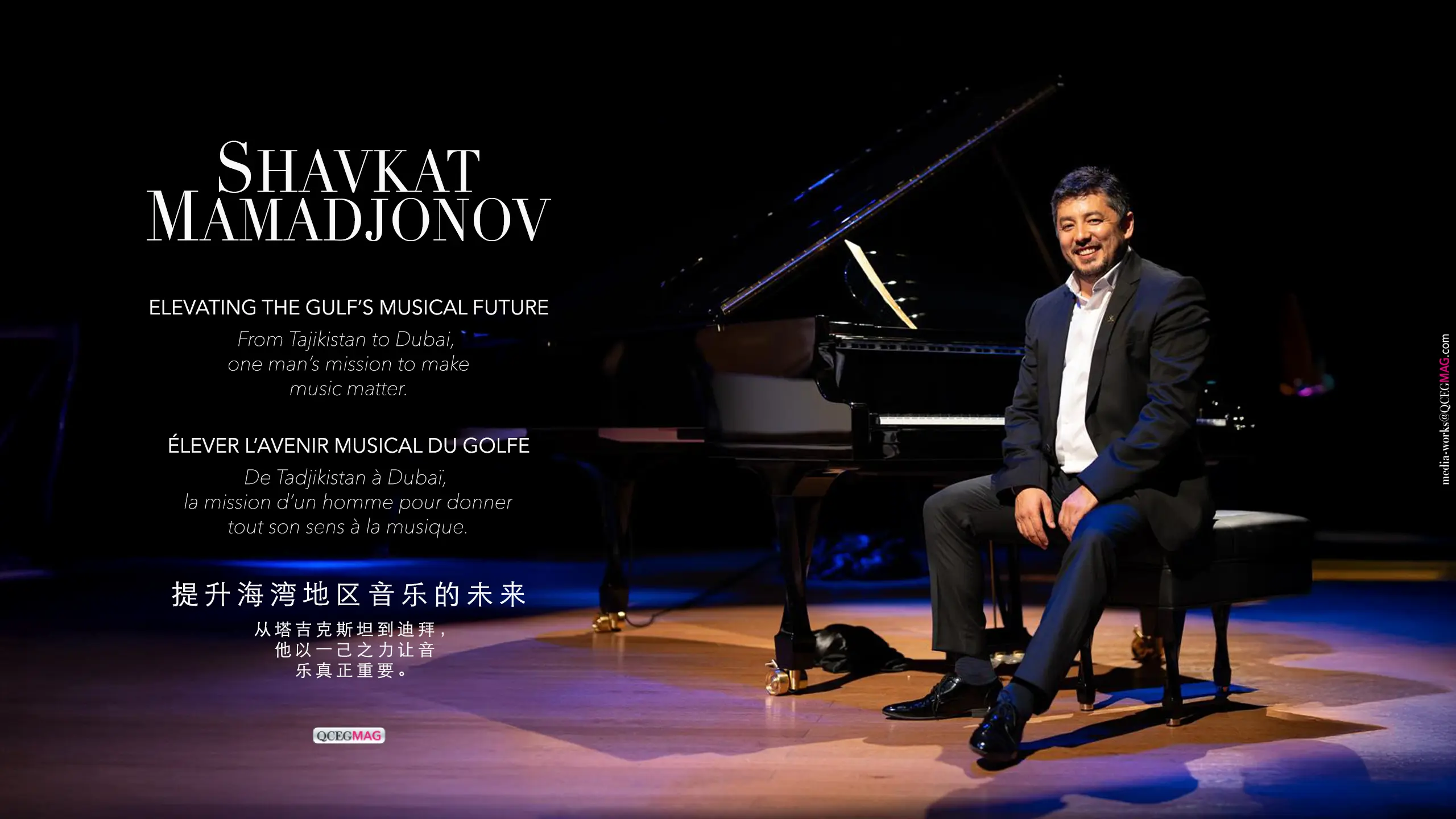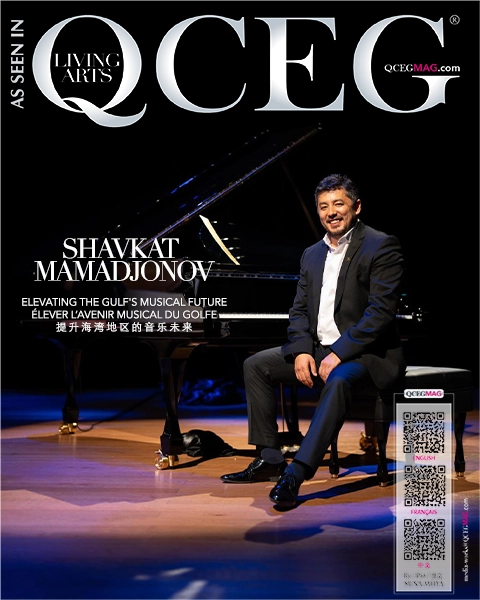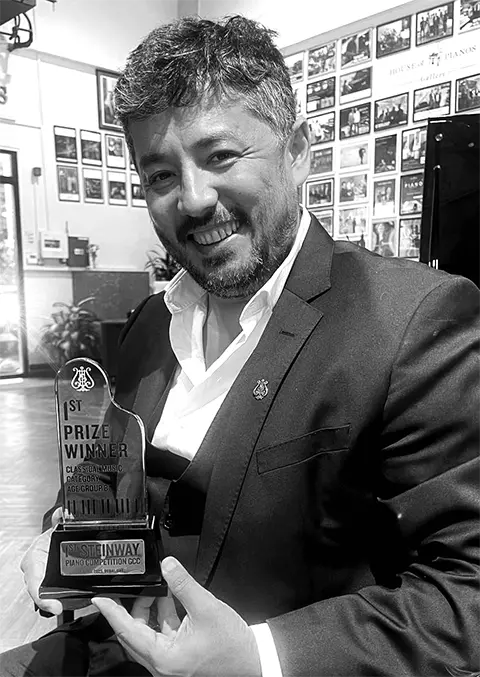

Editor-In-Chief
MeeKar Lim
International Fashion Editor
Suna Moya
Editor-At-Large
Zhang XiaoXiao

Please contact:
media-works@qcegmag.com
or
WeChat:QCEGMAG_Contact
QCEG MAG is a publication covering a selection of news in fashion, beauty, accessories, celebrities, LIVING ARTS, sports TRAVELS and relating videos around the world. Our portal is currently available in English and Chinese Languages for our international readers & viewers.
Get to know our professional team and their passionate creativity at QCEGPro.com




ELEVATING THE GULF'S MUSICAL FUTURE
Shavkat Mamadjonov reshapes
the Gulf’s music scene
— from Tajikistan to Dubai,
his vision nurtures young talent
and makes music truly matter.

When Shavkat Mamadjonov arrived in the UAE, he wasn’t chasing the spotlight—he was building the stage. Over the years, he has quietly shaped the region’s musical landscape through a series of thoughtful initiatives that place artistry, education, and cultural connection at their heart.
From establishing House of Pianos to bringing Steinway & Sons to Dubai and launching the innovative Music Booth, his ventures have opened new doors for both musicians and audiences alike. Most recently, his vision gathered new momentum with the creation of the Steinway Piano Competition GCC, welcoming hundreds of young pianists and offering a powerful platform for emerging Emirati talent.
Whether through long-term mentorship, free community concerts, or immersive music camps, Shavkat’s work continues to cultivate a deeper appreciation for music across generations. Recognised with the UAE Golden Visa for his contributions, he remains a humble force—quietly championing a future where music is not merely heard, but profoundly felt.
We caught up with Shavkat between engagements in his packed schedule to talk legacy, purpose, and the quiet magic of pianos in a fast-paced world.
— SUNA MOYA
Video Clips Editing By QCEG
SHAVKAT MAMADJONOV
ELEVATING THE GULF'S MUSICAL FUTURE
Shavkat Mamadjonov reshapes the Gulf’s music scene — from Tajikistan to Dubai, his vision nurtures young talent and makes music truly matter.


Suna Moya: You didn’t come to Dubai as a musician, yet today you’ve reshaped its musical landscape. What was the moment you realised that music had to become your life’s work—not just a personal passion?
Shavkat Mamadjonov: I didn’t arrive in Dubai as a musician, but I did come with a profound respect for the transformative power of music. The turning point was when I understood my role wasn’t necessarily to perform but to shape the environment in which music could flourish. I found my own way of contributing: supporting musical education, nurturing young talent, and creating spaces and opportunities where music could grow.
In a world where technology advances rapidly and screens dominate our attention, I believe fostering a genuine connection with music is more important than ever. Music is essential to intellectual and emotional development—it cultivates discipline, creativity, and empathy. This conviction has evolved into a personal mission to ensure music retains its place in people’s lives and to actively support the growth of musical talent here in the UAE.
Suna Moya: Pianos are often seen as instruments of the past—classic, even nostalgic. Yet you’ve made them feel modern and essential in a region racing towards the future. What does the piano represent to you in today’s world?
Shavkat Mamadjonov: To me, the piano is the queen of instruments. Few others engage your entire being—your hands, feet, mind, and full attention. Playing demands coordination and presence, making it not only a musical act but an intrinsically human experience.
What’s remarkable is that despite centuries of innovation, the piano’s core design has remained almost unchanged—a testament to its timelessness. It isn’t merely an instrument; it’s a masterpiece of craftsmanship, each detail infused with passion and precision.
In today’s fast-moving world—especially in a region embracing rapid progress and technology—the piano serves as a grounding force. I’ve witnessed its transformative power not only in concert halls but in homes, schools, and therapy rooms. Its impact on both children and adults, including those with autism or other disabilities, is extraordinary. The piano matters—perhaps more than ever—because it connects us to ourselves and to one another in a profound and enduring way.
Suna Moya: Dubai is known for reinvention. How has the city shaped your approach—not just to business, but to culture and legacy?
Shavkat Mamadjonov: The UAE, and Dubai in particular, has been an endless source of inspiration. Its pace of evolution, its readiness to embrace global change, and its visionary leadership that puts people and progress at the centre of everything—these are truly remarkable.
Over the past 13 years, I’ve been fortunate to receive steadfast support from both Dubai and Abu Dhabi governments. That backing has empowered my work and confirmed that our visions align: to build a vibrant cultural landscape where art and music are accessible, valued, and celebrated.
Dubai’s spirit of reinvention has shaped my own outlook—not merely in business but in how I perceive legacy. It’s about creating something meaningful and lasting, something that contributes to the soul of the city. Through our initiatives, we’re helping to shape the UAE’s cultural narrative—one piano, one concert, one young talent at a time.
Suna Moya: You work at the intersection of luxury and art. How do you keep your mission rooted in meaning, not just aesthetics or profit?
Shavkat Mamadjonov: While profitability sustains any enterprise, my true passion has always been anchored in education, cultural enrichment, and community engagement. From the outset, I knew I didn’t want to build a business based solely on transactions—I wanted to create something enduring and purposeful.
When I chose to dedicate half of my showroom to the Steinway Concert Hall, many friends, partners, and even family members questioned the decision. They couldn’t understand why I’d surrender so much commercial space for something that wouldn’t directly generate revenue. But I was certain it was right.
Today, those same voices see the impact. Through free community concerts, hundreds of workshops and masterclasses, and countless student recitals, we’ve established a space that truly belongs to the UAE’s musical community—a place that teachers, musicians, and music lovers now consider their own.
For me, the intersection of luxury and art only has meaning when it serves a higher purpose. Balancing a successful business with meaningful contributions to the cultural and educational fabric of this region is, to me, the true definition of success.
Suna Moya: You’ve opened doors for international artists, yet you also create space for young local talents. Why is investing in the next generation—especially Emirati pianists—so important to you?
Shavkat Mamadjonov: There is no future without investing in the present, and that starts with the younger generation. The UAE is home to me—my children were born here, my family lives here, and everything I do is guided by the same devotion I’d show my own country.
Supporting young talent, particularly Emirati pianists, is not merely a duty—it’s a privilege. With the UAE’s growing cultural identity—from the launch of the UAE National Orchestra in Abu Dhabi to Dubai Culture’s own orchestra—the path ahead is exciting. But for these initiatives to thrive, we must prepare and empower the next generation.
That’s why we’ve concentrated so much effort on engaging Emirati families through our educational programmes, masterclasses, community concerts, and school expos. I see immense curiosity, commitment, and talent among Emirati youth. With the right guidance, many will shape the UAE’s cultural future. My role is simply to open the doors. Suna Moya: Music is invisible, yet it moves people deeply. In an age of AI and speed, how do you explain the enduring power of something so human, so slow, and so analogue?
Shavkat Mamadjonov: In a world driven by algorithms, speed, and artificial intelligence, music is a reminder of our humanity. Though invisible, its impact is profoundly felt. That is why I believe promoting music education—especially piano—matters more now than ever.
As technology advances, we must decide what to entrust to machines and what to preserve as uniquely human. The emotion, imperfection, and creativity in music can’t be replicated by AI. A machine may produce notes, but it cannot express longing, joy, or love as a human artist can.
I want to encourage people back into concert halls—to experience live music and feel something genuine and unfiltered. Music connects us, moves us, and often articulates what words cannot. Amid our fast-paced world, it is a vital reminder to slow down, listen, and feel.
Suna Moya: Your initiatives often carry a quiet generosity—free concerts, mentorships, access to instruments. Do you view music as a form of service? What is your intention behind that?
Shavkat Mamadjonov: Absolutely, I see music as a form of service. As a parent, I understand how an ordinary outing with your children can quickly become costly. That’s why creating something different—something meaningful and free—was so important to me.
Our community concerts embody that idea. They have become a gathering place where families listen, children discover, and curiosity is sparked. I’m especially proud of the educational aspect—our commentary concerts gently introduce audiences to the stories behind each piece, its composer, and its music.
We also ensure young local talents open each concert. This simple gesture creates a ripple effect: friends, families, and classmates come to support them, strengthening a vibrant cultural community. To me, it’s about giving people a place to belong, to grow, and to be inspired.
Suna Moya: You launched Music Booth to connect musicians with creative spaces worldwide. What do today’s artists need most—space, time, or freedom?
Shavkat Mamadjonov: When I launched Music Booth, the goal was straightforward: to make music accessible, affordable, and soundproof—anytime, anywhere. Too many artists still struggle to find spaces to practise or create without interruption. Whether they are travelling musicians, dedicated teachers, or ambitious students, access to a proper space remains one of their greatest challenges.
That’s why I believe what artists need most today is freedom—the freedom to play, practise, and express themselves without constraints like noise complaints, high rents, or limited availability. Music Booth is my response. Our mobile app and soundproof studio solutions give musicians that freedom.
We aim to place Music Booths in major hotels, community centres, shopping malls, and even airports—ensuring that whenever inspiration strikes, a professional space is within reach. Music should never be limited by walls; it should be free to grow—just like the people who create it.
Suna Moya: Entrepreneurship is often spoken of in numbers and growth, but building within culture requires soul. What personal values guide your decisions?
Shavkat Mamadjonov: For me, it’s simple: I believe in education’s power—especially arts education—and in making it affordable and accessible to all. That belief underpins every decision I take.
Suna Moya: If a ten-year-old pianist from anywhere in the GCC were sitting across from you—nervous, talented, and uncertain—what would you tell them about the road ahead?
Shavkat Mamadjonov: I’ve met many young Emirati and GCC pianists over the years, and each meeting reminds me how powerful and personal music can be. I always take time to speak with the children and their parents, to understand their motivations, what music means to them, and how we can support their journey.
One inspiring example is a young Emirati pianist named Zayed. We’ve been proud to support him not only with opportunities to perform and grow but by guiding his parents in nurturing his gift. For me, it’s about creating an environment where young musicians feel seen, supported, and encouraged to follow their passion.
Suna Moya: One final question, Shavkat — if your life were a piece of music, what would it sound like now? And more importantly, who would you want to hear it?
Shavkat Mamadjonov: It would be a blend of classical, oriental, and modern music—that’s the best reflection of my life: embracing diversity and change. I’d want the world to hear it—especially the parents of talented children who may not yet have received the recognition or support they deserve.